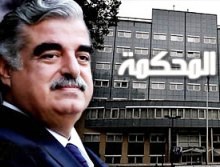 By David Kenner
By David Kenner
We’re happy to feature today an excerpt from Michael Young’s new book, The Ghosts of Martyrs Square, that explores the immediate aftermath of the assassination of former Lebanese Prime Minister Rafiq al-Hariri on February 14, 2005. I caught up with Young to hear his thoughts on how this event continues to reverberate, both in Lebanon and in the international arena. Here’s what he had to say:
FP: How does Hariri’s assassination continue to affect Lebanese politics today?
Young : In the aftermath of Rafiq al-Hariri’s assassination on February 14, 2005, the U.N. Security Council established an independent commission to investigate the crime, the first time the organization had ever done such a thing. In 2007, the Security Council went further and created a Special Tribunal for Lebanon to indict the guilty. Indictments may come later this year or early next, and Lebanese political life is bracing for the consequences, given that although Syria likely gave the order and a suicide bomber actually carried out the attack, Lebanese parties — many people in Beirut believe Hezbollah — participated in some capacity. There is fear that an accusation against Hezbollah, if the party was indeed involved, or against other Lebanese might destabilize Lebanon. Still, the Lebanese authorities have a responsibility to go through with this, since from the outset those who supported the investigation and tribunal knew where it might lead, and saw these measures as a way of preventing similar killings in the future. On a more personal level, I feel that for the tribunal to truly succeed, it has to identify all the guilty, not merely low-level enablers. However, I’m not at all sure that this will be the outcome.
FP: You discuss how Hariri’s murder caused a fundamental split between the Lebanese Sunni community and the Syrian regime. Has this relationship healed with time, or do Lebanese Sunnis still largely hold Syria responsible for the death of Hariri?
Young: The Sunnis know who killed Hariri, but the imperatives of Arab politics have intervened to alter the Sunni-Syrian relationship. Just over a year ago, Saudi Arabia began a reconciliation process with Syria–its intention to draw Damascus away from Iran, whose rise the Arab countries, particularly those in the Gulf, view as a threat to their own regimes. An implicit quid pro quo emerged, whereby the Saudis gave Syria greater latitude in Lebanon, in part to contain the pro-Iranian Hezbollah. The Syrians gladly took that offer in order to reimpose their writ in Beirut, but have offered little in exchange. Syria’s regime has maintained its close ties with Tehran and continues to arm and support Hezbollah. A byproduct of that Saudi-Syrian rapprochement was a so-called ‘reconciliation’ last December between Lebanese Prime Minister Saad al-Hariri, Rafiq’s son who is politically beholden to the Saudis, and Syrian President Bashar al-Assad. The Sunnis today have less room to condemn Syria, but neither they nor Saad Hariri himself have forgotten what happened to Rafiq al-Hariri.
FP: The Obama administration recently announced the appointment of Robert Ford as ambassador to Syria — the first ambassador to the country since the United States withdrew its ambassador following Hariri’s assassination. What was the U.S. reaction in response to this attack, and is its resolve to bring the perpetrators to justice waning?
Young: I don’t see evidence that American interest in bringing the perpetrators to justice is waning, and from what I’m hearing that’s not the case. But can we be sure? The Hariri investigation (which was independent, we should remember) was and is a complex case that has suffered from investigative flaws. Those shortcomings have tested the commitment of many countries, amid continued reluctance at U.N. headquarters to deal with the consequences of a potentially destabilizing investigation. I don’t necessarily believe that Robert Ford’s appointment is a sign that Washington has given up on the Hariri investigation. My problem with the step is that the Obama administration got nothing in exchange for that concession; but paradoxically that may only increase its interest in seeing the Hariri tribunal through, in the hope that the ensuing accusations allow it to squeeze the Syrians. That’s not to say the indictments, if or when they come, will serve a specific political agenda, but there is no doubt that they will have political consequences. Foreign Policy

Leave a Reply
You must be logged in to post a comment.